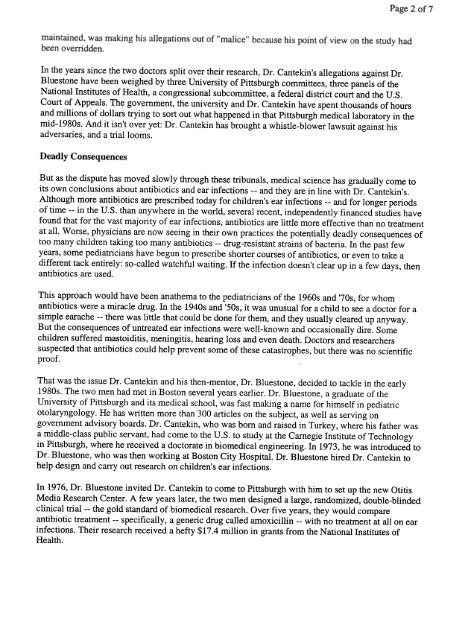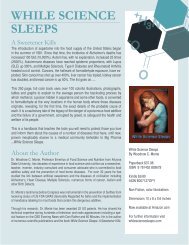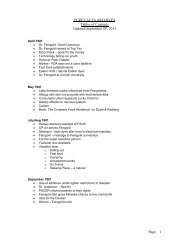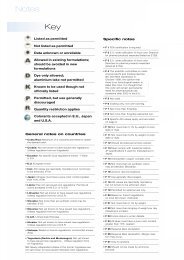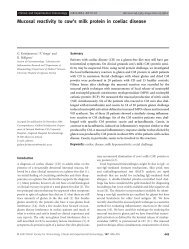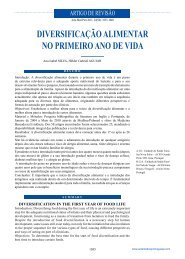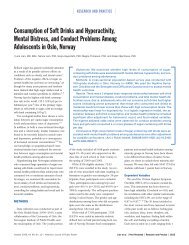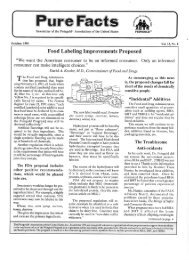PITTSBURGH --When Erdem Cantekin declared a war of ethics on ...
PITTSBURGH --When Erdem Cantekin declared a war of ethics on ...
PITTSBURGH --When Erdem Cantekin declared a war of ethics on ...
Create successful ePaper yourself
Turn your PDF publications into a flip-book with our unique Google optimized e-Paper software.
Page 2 <str<strong>on</strong>g>of</str<strong>on</strong>g> 7<br />
maintained, was making his allegati<strong>on</strong>s out <str<strong>on</strong>g>of</str<strong>on</strong>g> "malice" because his point <str<strong>on</strong>g>of</str<strong>on</strong>g> view <strong>on</strong> the study had<br />
been ovelTidden.<br />
In the years since the two doctors split over their research, Dr. <str<strong>on</strong>g>Cantekin</str<strong>on</strong>g>'s allegati<strong>on</strong>s against Dr.<br />
Bluest<strong>on</strong>e have been weighed by three University <str<strong>on</strong>g>of</str<strong>on</strong>g> Pittsburgh committees, three panels <str<strong>on</strong>g>of</str<strong>on</strong>g> the<br />
Nati<strong>on</strong>al Institutes <str<strong>on</strong>g>of</str<strong>on</strong>g> Health, a c<strong>on</strong>gressi<strong>on</strong>al subcommittee, a federal district court and the U.S.<br />
Court <str<strong>on</strong>g>of</str<strong>on</strong>g> Appeals. The government, the university and Dr. <str<strong>on</strong>g>Cantekin</str<strong>on</strong>g> have spent thousands <str<strong>on</strong>g>of</str<strong>on</strong>g> hours<br />
and milli<strong>on</strong>s <str<strong>on</strong>g>of</str<strong>on</strong>g> dollars trying to sort out what happened in that Pittsburgh medical laboratory in the<br />
mid-1980s. And it isn't over yet: Dr. <str<strong>on</strong>g>Cantekin</str<strong>on</strong>g> has brought a whistle-blower lawsuit against his<br />
adversaries, and a trial looms.<br />
Deadly C<strong>on</strong>sequences<br />
But as the dispute has moved slowly through these tribunals, medical science has gradually come to<br />
its own c<strong>on</strong>clusi<strong>on</strong>s about antibiotics and ear infecti<strong>on</strong>s --and they are in line with Dr. <str<strong>on</strong>g>Cantekin</str<strong>on</strong>g>'s.<br />
Although more antibiotics are prescribed today for children's ear infecti<strong>on</strong>s --and for l<strong>on</strong>ger periods<br />
<str<strong>on</strong>g>of</str<strong>on</strong>g> time --in the U.S. than anywhere in the world, several recent, independently financed studies have<br />
found that for the vast majority <str<strong>on</strong>g>of</str<strong>on</strong>g> ear infecti<strong>on</strong>s, antibiotics are little more effective than no treatment<br />
at all. Worse, physicians are now seeing in their own practices the potentially deadly c<strong>on</strong>sequences <str<strong>on</strong>g>of</str<strong>on</strong>g><br />
too many children taking too many antibiotics --drug-resistant strains <str<strong>on</strong>g>of</str<strong>on</strong>g> bacteria. In the past few<br />
years, some pediatricians have begun to prescribe shorter courses <str<strong>on</strong>g>of</str<strong>on</strong>g> antibiotics, or even to take a<br />
different tack entirely: so-called watchful waiting. If the infecti<strong>on</strong> doesn't clear up in a few days, then<br />
antibiotics are used.<br />
This approach would have been anathema to the pediatricians <str<strong>on</strong>g>of</str<strong>on</strong>g> the 1960s and'70s, for whom<br />
antibiotics were a miracle drug. In the 1940s and '50s, it was unusual for a child to see a doctor for a<br />
simple earache --there was little that could be d<strong>on</strong>e for them, and they usually cleared up anyway.<br />
But the c<strong>on</strong>sequences <str<strong>on</strong>g>of</str<strong>on</strong>g> untreated ear infecti<strong>on</strong>s were well-known and occasi<strong>on</strong>ally dire. Some<br />
children suffered mastoiditis, meningitis, hearing loss and even death. Doctors and researchers<br />
suspected that antibiotics could help prevent some <str<strong>on</strong>g>of</str<strong>on</strong>g> these catastrophes, but there was no scientific<br />
pro<str<strong>on</strong>g>of</str<strong>on</strong>g>.<br />
That was the issue Dr. <str<strong>on</strong>g>Cantekin</str<strong>on</strong>g> and his then-mentor, Dr. Bluest<strong>on</strong>e, decided to tackle in the early<br />
1980s. The two men had met in Bost<strong>on</strong> several years earlier. Dr. Bluest<strong>on</strong>e, a graduate <str<strong>on</strong>g>of</str<strong>on</strong>g> the<br />
University <str<strong>on</strong>g>of</str<strong>on</strong>g> Pittsburgh and its medical school, was fast making a name for himself in pediatric<br />
otolaryngology. He has written more than 300 articles <strong>on</strong> the subject, as well as serving <strong>on</strong><br />
government advisory boards. Dr. <str<strong>on</strong>g>Cantekin</str<strong>on</strong>g>, who was born and raised in Turkey, where his father was<br />
a middle-class public servant, had come to the U.S. to study at the Camegie Institute <str<strong>on</strong>g>of</str<strong>on</strong>g> Technology<br />
in Pittsburgh, where he received a doctorate in biomedical engineering. In 1973, he was introduced to<br />
Dr. Bluest<strong>on</strong>e, who was then working at Bost<strong>on</strong> City Hospital. Dr. Bluest<strong>on</strong>e hired Dr. <str<strong>on</strong>g>Cantekin</str<strong>on</strong>g> to<br />
help design and carry out research <strong>on</strong> children's ear infecti<strong>on</strong>s.<br />
In 1976, Dr. Bluest<strong>on</strong>e invited Dr. <str<strong>on</strong>g>Cantekin</str<strong>on</strong>g> to come to Pittsburgh with him to set up the new Otitis<br />
Media Research Center. A few years later, the two men designed a large, randomized, double-blinded<br />
clinical trial --the gold standard <str<strong>on</strong>g>of</str<strong>on</strong>g> biomedical research. Over five years, they would compare<br />
antibiotic treatment --specifically, a generic drug called amoxicillin --with no treatment at all <strong>on</strong> ear<br />
infecti<strong>on</strong>s. Their research received a hefty $17.4 milli<strong>on</strong> in grants from the Nati<strong>on</strong>al Institutes <str<strong>on</strong>g>of</str<strong>on</strong>g><br />
Health.


